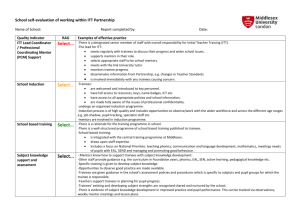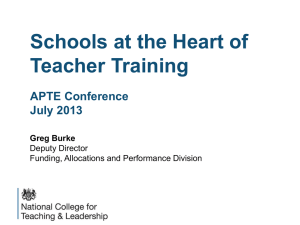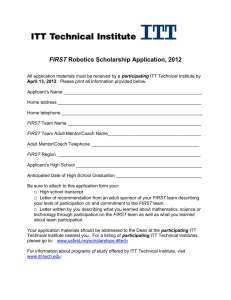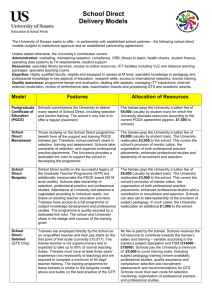School Self evaluation form with explanation (2)
advertisement
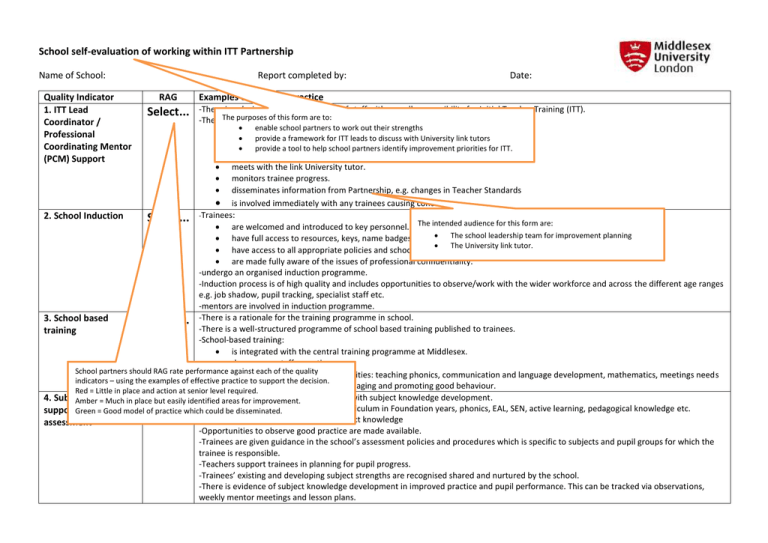
School self-evaluation of working within ITT Partnership Name of School: Quality Indicator 1. ITT Lead Coordinator / Professional Coordinating Mentor (PCM) Support Report completed by: RAG Date: Examples of effective practice -There is a designated senior member of staff with overall responsibility for Initial Teacher Training (ITT). The for purposes -The lead ITT: of this form are to: enable school partners to work out their strengths meets regularly with trainees to discuss their progress and wider school issues. provide a framework for ITT leads to discuss with University link tutors supports mentors in their role. provide a tool to help school partners identify improvement priorities for ITT. selects appropriate staff to be school mentors. meets with the link University tutor. monitors trainee progress. disseminates information from Partnership, e.g. changes in Teacher Standards is involved immediately with any trainees causing concern. Trainees: 2. School Induction Select... are welcomed and introduced to key personnel. The intended audience for this form are: The school leadership team for improvement planning have full access to resources, keys, name badges, ICT etc. The University link tutor. have access to all appropriate policies and school information. are made fully aware of the issues of professional confidentiality. -undergo an organised induction programme. -Induction process is of high quality and includes opportunities to observe/work with the wider workforce and across the different age ranges e.g. job shadow, pupil tracking, specialist staff etc. -mentors are involved in induction programme. 3. School based Select... -There is a rationale for the training programme in school. -There is a well-structured programme of school based training published to trainees. training -School-based training: is integrated with the central training programme at Middlesex. draws upon staff expertise. School partners should RAG rate performance each of theon quality against includes a focus National Priorities: teaching phonics, communication and language development, mathematics, meetings needs indicators – using the examples of effective practice to support the decision. of pupils with EAL, SEND and managing and promoting good behaviour. Red = Little in place and action at senior level required. - Mentors how to support trainees with subject knowledge development. 4. Subject knowledge Amber = Much in place but easily identified areasknow for improvement. Select... -Other staff provide guidance e.g. the curriculum in Foundation years, phonics, EAL, SEN, active learning, pedagogical knowledge etc. supportGreen and = Good model of practice which could be disseminated. -Specific training is given to develop subject knowledge assessment -Opportunities to observe good practice are made available. -Trainees are given guidance in the school’s assessment policies and procedures which is specific to subjects and pupil groups for which the trainee is responsible. -Teachers support trainees in planning for pupil progress. -Trainees’ existing and developing subject strengths are recognised shared and nurtured by the school. -There is evidence of subject knowledge development in improved practice and pupil performance. This can be tracked via observations, weekly mentor meetings and lesson plans. Select... 5. Formative and Summative reporting Select... 6. Quality Assurance Select... 7. Involvement in leadership of ITT Partnership Select... 8. Teaching experience on placement Select... -Judgements and grades are consistent with recorded targets on weekly meeting records and have been discussed with the trainee. -Formative and Summative reports contain explicit action points for subject knowledge development. -Summative reports provide the trainee and the trainee’s next school with a clear understanding of his/her strengths and areas for development, including subject knowledge. -The ITT lead quality assures the work of mentors, e.g. through joint lesson observation with mentors, sampling trainee files, ATS and weekly mentor meeting records. -ITT Lead meets with link tutor tutors to discuss working towards consistency between schools across all areas of school work with trainees. -There is some whole school moderation of lesson observations and feed back in order to reach consistently high standards e.g. some cross teacher/department observations. -The ITT Lead supports mentors in completion of documents to achieve consistent high quality practice. - All mentors have received mentor training. -Schools are systematic in collecting trainee feedback and using it to consider action for improvement. -The impact of trainees on pupils progress is tracked. -There is clear documentary evidence of QA processes and procedures that are reviewed regularly. -Information about NQT progress and impact is exchanged with Middlesex University. -School contributes to Partnership Steering Group meetings. -There is evidence of sharing best practice between schools e.g. mentor and PCM conference. -There are opportunities for staff to involve themselves with other Partnership activities e.g. interviewing and central training. -ITT Lead keeps the Head teacher and all relevant staff abreast of Partnership developments. -ITT Lead is able to say how some Middlesex Improvement Plan Priorities may be addressed by the school. -Partnership working with Middlesex is an item on the school’s improvement plan. -An appropriate programme of timetabled lessons and other experiences is planned with the trainee to enable them to make progress against the teaching standards. -There is effective modelling of quality teaching by host teachers and other key staff in school. -Effective use of TAs and other support staff is planned. -Trainee is required to plan alongside the class teacher if relevant. -Class teacher supports the trainee to improve teaching and learning of pupils. -Trainees have opportunities for team and solo teaching as appropriate. -The mentor supports the trainee’s engagement with central and school based training tasks and assignments and seeks out opportunities for the trainee to complete these tasks -There is evidence of personalisation in the teaching programme and other opportunities are offered to enable trainees to develop their knowledge, understanding and practice e.g. participation in extra-curricular and out of school activities, INSET, subject enhancement etc. -School encourages trainees to share findings of tasks and assignments with appropriate school staff. Action Points for quality indicators: This is where you use your RAG rating and the examples of effective practice to help identify improvement priorities that could inform school improvement planning for ITT partnership.
